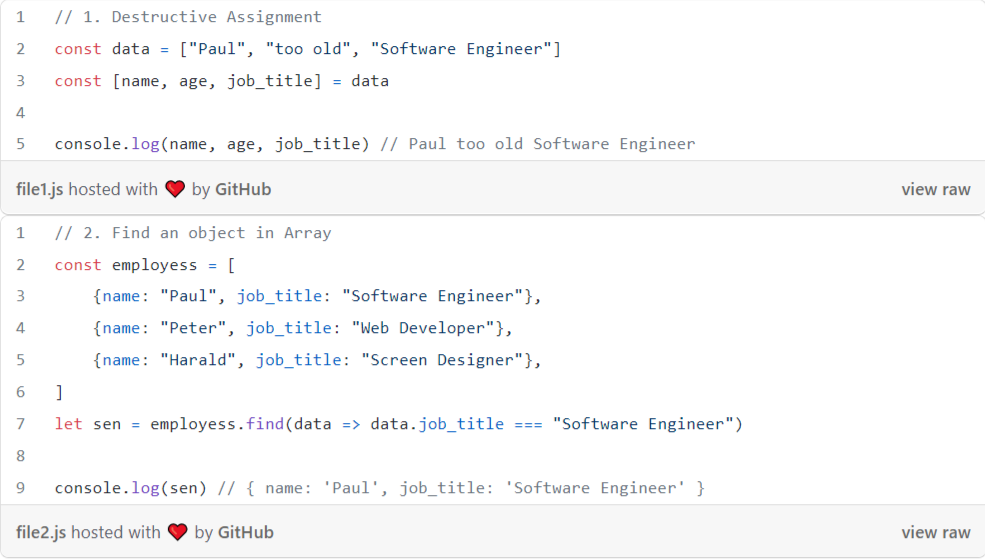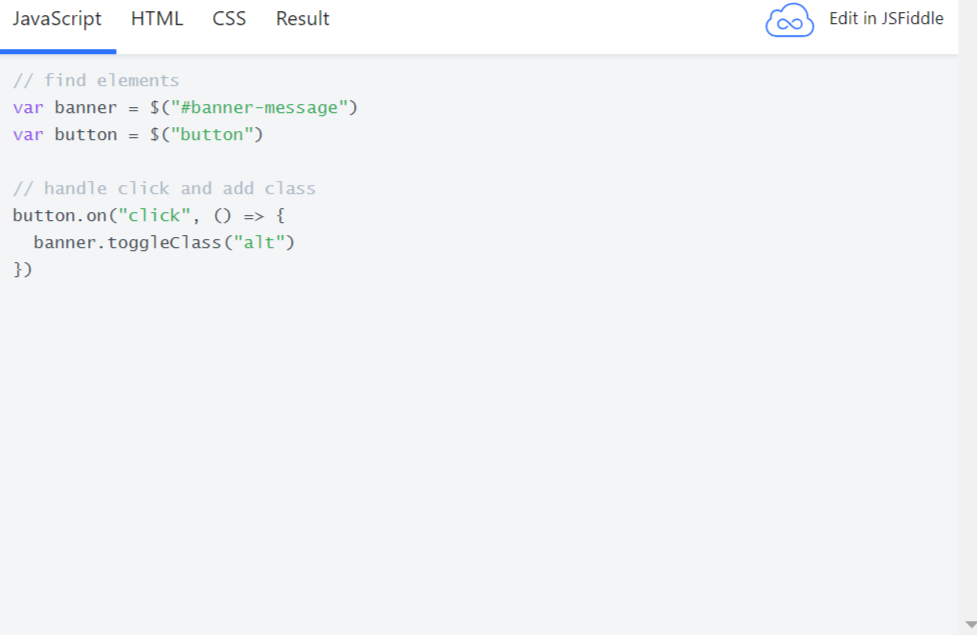アプリ関連ニュース
Unity ドロップダウンUIの使用方法
nishida at 2022年01月06日 10:00:00
- 2022年1月06日
- 未分類
5 Website To Help You Create Beautiful JavaScript Code Snippets For Your Medium Articles
While writing technical development articles you will often show some code blocks. You can either take a screenshot of your favorite IDE while it shows the code or you can use the simple Medium code formatting by pressing ```. But instead of using any of those two approaches, I would suggest using any or all of the websites presented within this article.
1. GitHub Gists
The main website to create code blocks is GitHub Gists. You can simply go to https://gist.github.com and add your code into the Gist. Also, you can add multiple files to one single Gist and use them independently in your article.

2. carbon.now.sh
This website is really simple. You can log in with your GitHub profile and start creating snippets. Go to and insert your code. It will be automatically saved into your profile and can be accessed by the URL.
As an example, https://carbon.now.sh/XHGvwhmthQjAZLJAWNoA
The content will look like this in Medium:

3. JSFiddle
JSFiddle is a famous javascript code playground where you can test your HTML, CSS, and JS in the browser.
Additionally, these code blocks can be imported into Medium as an embed. Within Medium you will have one block with a tab menu that can be switched.
I use this fiddle as an example: https://jsfiddle.net/paulknulst/odLg3qu1/
As you can see you can switch between JavaScript, HTML, CSS, and Result. Within Result, you can see the outcome after the three “files” are combined and run by jsfiddle.net.

4. Codepen.io
Codepen is comparable to JSFiddle. You can also add HTML, CSS, and JS and import them into Medium.
I use this as an example: https://codepen.io/paulknulst/pen/NWaXwdW

As you can see you can switch between JavaScript, HTML, CSS, and Result. It looks different from JSFiddle but contains the same information.
5. Codesandbox.io
With Codesandbox.io you are able to create complete sandboxes for your project that will run within the browser.
If you start with this website you can choose a sample sandbox from a list of predefined sandboxes

After you choose your template all needed files will be created and you can change them in the integrated IDE and see the result in an embedded browser window.
I really hope you find this article helpful and can use any of the websites in your development articles.
Tsuki
tsuki at 2022年01月06日 10:00:00
- 2021年12月28日
- 他の話題
年末年始営業のご案内
拝啓 年の瀬も押し詰まり、ご多用のことと存じ上げます。
さて、誠に勝手ながら、弊社の年末年始の営業は、下記のとおりとさせていただきます。
皆様にはご迷惑をお掛けしますが、何卒ご容赦願います。
今年一年ご愛顧を賜りまして大変感謝申し上げますと伴に、皆様のご多幸をお祈りいたします 。
敬具
記
年内営業 令和3年12月28日 13:00まで
年始営業 令和4年1月5日 10:00より
SH at 2021年12月28日 02:39:39
- 2021年12月28日
- 技術情報
Useful Nodejs Packages
Today I would like to share about useful packages of Nodejs. The followings are a collection of some useful packages for Nodejs. Let’s take a look.
Web Frameworks
express
Express is the most popular, fast, and minimalist web framework for node.js backends.
socket.io
Socket.IO enabled real-time bidirectional event-based communication using long-polling or webSockets with disconnection detection and auto-reconnection support.
Utility Functions
async
Async is a module with powerful utility functions for working with asynchronous JavaScript.
rxjs
RxJS is a modular set of libraries to compose asynchronous and event-based programs using observable collections and compositions in JavaScript.
lodash
Lodash is a utility library that makes JavaScript easier by taking the hassle out of working with arrays, numbers, objects, strings, etc.
underscore
Underscore.js is a utility-belt library for JavaScript that provides support for the usual functional suspects (each, map, reduce, filter, etc.) without extending any core JavaScript objects.
ramda
Ramda is a practical, functional library with side-effect free functions composable with currying.
validator
Validator is a library of string validators and sanitizers.
day.js
Day.js is a minimalist JavaScript library that parses, validates, manipulates, and displays dates and times for modern browsers with a largely Moment-compatible API.
date-fns
Date-fns provides the most comprehensive, yet simple and consistent toolset for manipulating JavaScript dates in a browser & Node.js.
jsonwebtoken
Jsonwebtoken is a library to sign, verify and decode JSON Web Tokens.
bcrypt
Bcrypt is a library to hash and verify passwords with sync, callbacks, and promise interface.
uuid
UUID is a library to create RFC4122 universally unique identifiers.
Working With File System
fs-extra
FS-extra adds file system methods that aren’t included in the native fs module and adds promise support to the fs methods.
mkdirp
Just like mkdir -p, mkdirp recursively creates the directory and all necessary subdirectories.
glob
Glob is a library to match files using multiple patterns.
Working with Emails
Nodemailler
Nodemailer is a secure framework that handles email management in your Node.js applications.
This is all for now.
Hope you enjoy that.
By Asahi
waithaw at 2021年12月28日 10:00:00
- 2021年12月27日
- 技術情報
Web3
The evolution of the Web is often divided into three stages: Web 1.0, Web 2.0, and Web 3.0. The Web has evolved significantly over the years, and today’s applications are a lot different from the early days.

Web 1.0
This was the first version of the web. Most of the participants were content consumers, and the creators were developers building websites that contained information presented simply in text or image format. It lasted from approximately 1991 to 2004.
They are basically static content instead of dynamic HTML(including actions and databases). The data and content was provided from a static file system rather than a database, and the sites didn’t have a lot of interactivity at all. This can also be regarded as read only web
Web 2.0
You can think of web2 as an interactive and social web. Most of us also are also interacting with web 2 nowadays.
You don’t have to be a developer to participate to be a creator. Many apps are built to make it easy for anyone to become a creator. If you want to create an idea and share it with the world, you can simply do using many platforms. If you want to upload a video or post and millions of people can watch, interact with, and comment on it.
Web 2 is really simple, and because of its simplicity, more and more people around the world are becoming creators. The current form of the web is really cool in many ways, but there are some down sides
Web 2.0 Cons
When a company releases a popular application, the user experience is usually very sophisticated as the application continues to grow in popularity. At first, many companies don’t care about monetization. They have a strict focus on growth and new user acquisition, but in the end they started making profits.
Investors often expect a return on investment and push the companies onto advertising or selling personal data instead of choosing an organic sustainable growth.
Data breaches occur often in Web2 applications. You also have no control over the data or how the data is stored. In fact, enterprises often track and store user data without the consent of the user and are managed by the enterprise responsible platforms.
On the other hand, users living in countries that have to worry about the negative effects of freedom of speeches are also at risk. Governments and other authorities often shut down servers or freeze bank accounts if they believe that a person has expressed an opinion that is going against them.
Web 3.0
Web3 improves the Internet as we know it today and has several other benefits. Self-control, trustable, no permission, decentralized, robust, etc. With web3, developers don’t create and deploy applications that run on a single server or store data in a single database.
Web3 applications run on blockchains, distributed networks of many peer-to-peer nodes (servers), or a combination of both. These applications are often referred to as Dapps (Decentralized Applications).
You will find that cryptocurrencies are usually part of a conversation on web3. Cryptocurrencies play an important role in these protocols.
People can participate in the protocol and earn a living in different ways, both technically and non-technically. Consumers of the service often pay to use the protocol. For example, you would pay a cloud provider like AWS now for a single dedicated node. But with web3, money is sent directly to the participants in the network. In these decentralization scenarios (there are other forms of decentralization as well), many unnecessary and inefficient intermediaries are no longer needed.
Let’s look at another example of organizational structure. There are projects that are becoming more popular and anyone can participate in or invest in these projects. The company announces the launch of x tokens, offering 10% to the first builder, selling 10% to the public, and booking the rest for future payments of contributors and project fundings.
Stakeholders can use the tokens to vote for future changes in the project, and those who help build the project can make money by selling some of the holdings(tokens) after the tokens are released.
People who believe in the project can buy and hold ownership and those who think the project is going in the wrong direction can lead this by selling their stock.
There are still many stuffs if we are talking about web3 but let me stop here for now. If I have any chance, I will talk about more in future.
Yuuma
yuuma at 2021年12月27日 10:00:00